I am thrilled to tell you about two things, and then to share a few really remarkable books. This is pretty vital stuff for us—on the joys of reading, the call to think seriously (and freely) and to relate essential core convictions of the faith to every thing we read and think. We cover that last part a lot, here, the need for a Biblically-rooted Christian mind.
Reading, as I often say, is a spiritual discipline, so learning about how to learn, reading about reading, is helpful. And if you love books and bookstores, such reading can bring you much pleasure. So, some books about books and the joys and hurdles of reading in our hot-wired age. I have been really moved by a handful of titles which I must commend to you.
But first, news: I am very glad to share that I am speaking at a conference in Dallas this weekend hosted by David Naugle, of the honors college at Dallas Baptist University. David is a man I admire, whose two books I love (each in different ways–Worldview: The History of a Concept and Reordered Loves, Reordered Lives.) If you are curious, or want to pray for me in an informed way, check out this overview of the Paidieia conference. You can see my three keynote talks, all around the famous Latin phrase that Augustine heard Tolle Legge, or Pick Up and Read. I shall make a case with stories, Scripture and lots of book quotes, that we should care about books and reading because people matter (and sharing books is an act of love), because words matter, and because ideas matter. We will celebrate reading, the book, and maybe good bookstores and libraries, a bit, too.
And, I’ll get to hear the New Agrarians (Pierce Pettis, Kate Campbell and Tom Kimmel, who once quipped they are like a redneck Peter Paul and Mary.) I’ll be in the presence of some of the finest lyricists around—you can’t imagine how nervous I am.
In the middle of my preparations for the Texas event, praying and pondering and reading on the run about this looming topic, why reading still matters and the future of the book, I was asked to write a short blog piece for the prestigious The High Calling website. You should get their stuff—and join in their virtual community. Good writers and thoughtful folk gather there to reflect on how faith relates to all of life, especially the work-world. It is hosted by the Laity Lodge, a good group, also in Texas. 

Please check out my column there which they titled Style Matters, where I write about the first book that really captured me as a youth and why I didn’t tear it up. I write about how style matters, how different folks want different sorts of things from books, but we all, usually, use both sides of our brains—we want content and lovely prose, truth, well told. I mention the important (heady) book, now out in paperback, Proust and the Squid: The Story and Science of the Reading Brain (Harper; $14.99), by Tufts University developmental psychologist, dyslexia expert, and historian of language, Maryanne Wolf, which you ought to know about. I hope you enjoy my little essay—I’m happy with how it turned out. If you click on it now, be sure to come back.
Matters, where I write about the first book that really captured me as a youth and why I didn’t tear it up. I write about how style matters, how different folks want different sorts of things from books, but we all, usually, use both sides of our brains—we want content and lovely prose, truth, well told. I mention the important (heady) book, now out in paperback, Proust and the Squid: The Story and Science of the Reading Brain (Harper; $14.99), by Tufts University developmental psychologist, dyslexia expert, and historian of language, Maryanne Wolf, which you ought to know about. I hope you enjoy my little essay—I’m happy with how it turned out. If you click on it now, be sure to come back.
Six great books I’ve recently read about books and reading. I’ve been up late lately, that is for sure. And it was worth it. I am so, so excited about each.
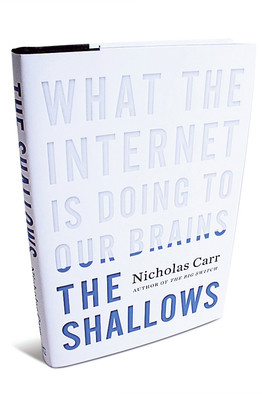 The Shallows: What the Internet Is Doing to Our Brains Nicholas Carr (Norton) $26.95 Stop the presses! I’ve always wanted to shout that and need to mean it. I was way wrong. This was one of the top books of 2010, but I hadn’t read it when I did my best of list so it didn’t make my cut. I really was remiss in not awarding it. Why hadn’t I gotten around to reading it? What was I thinking? Now, I want to name it as one of the best books in years. I guess I thought–yeah, yeah, internet is bad, Web 2.0 is dumbing us all down, shimmering pixels re-wire the brain. Got it. I knew about the famous piece Carr wrote “Is Google Making us Stupid?” in a 2008 The Atlantic Monthly. I had no idea—no idea!— how engaging and powerful and insightful and beautiful and provocative and important this was. I apologize to my readers: this should have been on the top of the list. It is a must read. And if you are following me, here in cyberspace, distracted by hyperlinks and pop-ups videos and all manner of neurological shenanigans, maybe you and I need it more than others. Really. (And did you notice I drop it into my call for civility in the Rob Bell debate? Somehow, this erosion of clear-headed thinking may have lessened our capacity for calm, ratcheting up the volumes in the culture wars. Can deep reading help? Can love of literature make a difference? Can we be engaged readers if our temperaments and synapses are firing in new ways?) This major book is not coming out in paperback soon, so spring for it now before your brain cells erode even more.
The Shallows: What the Internet Is Doing to Our Brains Nicholas Carr (Norton) $26.95 Stop the presses! I’ve always wanted to shout that and need to mean it. I was way wrong. This was one of the top books of 2010, but I hadn’t read it when I did my best of list so it didn’t make my cut. I really was remiss in not awarding it. Why hadn’t I gotten around to reading it? What was I thinking? Now, I want to name it as one of the best books in years. I guess I thought–yeah, yeah, internet is bad, Web 2.0 is dumbing us all down, shimmering pixels re-wire the brain. Got it. I knew about the famous piece Carr wrote “Is Google Making us Stupid?” in a 2008 The Atlantic Monthly. I had no idea—no idea!— how engaging and powerful and insightful and beautiful and provocative and important this was. I apologize to my readers: this should have been on the top of the list. It is a must read. And if you are following me, here in cyberspace, distracted by hyperlinks and pop-ups videos and all manner of neurological shenanigans, maybe you and I need it more than others. Really. (And did you notice I drop it into my call for civility in the Rob Bell debate? Somehow, this erosion of clear-headed thinking may have lessened our capacity for calm, ratcheting up the volumes in the culture wars. Can deep reading help? Can love of literature make a difference? Can we be engaged readers if our temperaments and synapses are firing in new ways?) This major book is not coming out in paperback soon, so spring for it now before your brain cells erode even more.
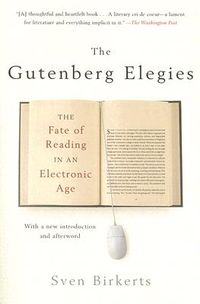 The Gutenberg Elegies: The Fate of Reading In An Electronic Age Sven Birkerts (Faber & Faber) $16.00
The Gutenberg Elegies: The Fate of Reading In An Electronic Age Sven Birkerts (Faber & Faber) $16.00
This is one of my all time favorite books, and I am reading portions for a third time. Birkerts’ call to deep reading, his memoiristic reflections about loving books (and working in a bookstore) and his fears about “electronic” culture all are so very interesting, very compelling, evoking all kinds of thoughts, memories and feelings. He’s a serious reader, of course, and he names a lot of authors and books, but his main concern is whether this style of engaging the world through some consensus about the importance of careful reading can endure amidst the fast-paced and hot-wired world of the Net. (And all this before facebook and twitter and the 2.0 interactive stuff–how very prescient!) Very elegantly written. The new preface and final coda (written when the second edition came out in 2006) are worth the price of the book. Wise, thoughtful, mature and literate. (And how about that mouse as a book-marker on the cover? Nice touch, eh?)
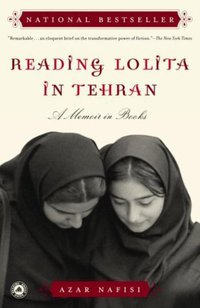 Reading Lolita in Tehran: A Memoir in Books Axar Nafisi (Random House) $16.95 How does reading Western literature, from Nabokov to Fitzgerald, effect a small group of Muslim women meeting in the author’s Iranian home? As one rave reviewer put it, this “reminds us why we read in the first
Reading Lolita in Tehran: A Memoir in Books Axar Nafisi (Random House) $16.95 How does reading Western literature, from Nabokov to Fitzgerald, effect a small group of Muslim women meeting in the author’s Iranian home? As one rave reviewer put it, this “reminds us why we read in the first
place.” The New Republic called it “anguished and glorious” and Margaret Atwood said of it, “Stunning…a literary life raft on Iran’s fundamentalist sea. All readers should read it.” Not only does she talk about reading great literature, and how it effects us, she portrays the indignities–and worse!—of the repressive regime. Nafisi comes from hundreds of years and over a dozen generations of scholars and her father was for a short time the mayor of Tehran. (He was imprisoned by the Ayatollah K.) Her own role in leftist revolution is explained and her years as a college professor became harrowing. Her descriptions of the jockeying for power between various factions of the Leninist left and the several sorts of radical Islamists is striking (and helpful for those who aren’t aware of these groupings within the revolution. And it got ugly—people disappearing for the smallest infractions, professors being executed, books being banned, bookstores burned. The chapter where she has a mock trial putting Gatsby on the stand made my draw drop in near disbelief.
I have to note, here, by the way, that although the fascists there—radical leftists or radical religionists—are not like those who smugly call me “heretic” on the internet because I suggested people at least appreciate some of Rob Bell, or read him earnestly for yourself, the spirit of book banning, of discouraging intellectual curiosity, of moralistic judgmentalism, is too similar not to be named. I get word from friends that people are speaking dishonestly about BookNotes, and while I do not fear, really, Ms Nafisi’s brave commitments to teach stuff that could get her killed brought a large lump to my throat and a bit of resolve to my work to encourage thoughtful engagement and civil discourse, even regarding books with which we disagree. This book couldn’t be more timely for me to read and if you haven’t read it, you really should consider it. I’m almost done and am very moved by it.
(By the way, I have never read Lolita, and I guess I thought it glorified the awful child molester. This author makes the obvious connection that the women in this repressive country are much like Dolly (her real name in the novel) and they must find ways to subvert the sexual and political violence against them. Powerful, urgent, stuff, well told. The deckled pages and french-fold cover makes this a very lovely book to hold, for which I am grateful.
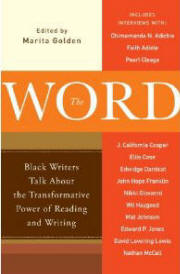 The Word: Black Writers Talk About the Transformative Power of Reading and Writing edited by Marita Golden (Broadway) $16.99 I simply could not stop reading these excellent interview with African-American authors, about their earliest memories of reading, their favorite books, their writing habits and how the traditions of black intellectual life was shaped in the 20th century. It is stunning to think of Nobel Prize winning historians, say, whose own parents could not read or write. The struggle for blacks to get library cards, the lack of awareness, for some, that there were books by people of color, the up-hill struggle to learn in less than easy situations. (Nathan McCall’s awareness of literature, and black literature especially, happened in prison.) These good interviews are just fascinating, every one of them, and we get to listen in. Kudos to Golden for seeking out the right folks, and asking them the right questions. I believe any and everyone would benefit from being inspired by these stories. It reminds us of a whole lot of very important stuff, about learning, gaining one’s own voice, the cost of serious reading, and how to value the tools, and develop the habits of being a life-long learner. Love it!
The Word: Black Writers Talk About the Transformative Power of Reading and Writing edited by Marita Golden (Broadway) $16.99 I simply could not stop reading these excellent interview with African-American authors, about their earliest memories of reading, their favorite books, their writing habits and how the traditions of black intellectual life was shaped in the 20th century. It is stunning to think of Nobel Prize winning historians, say, whose own parents could not read or write. The struggle for blacks to get library cards, the lack of awareness, for some, that there were books by people of color, the up-hill struggle to learn in less than easy situations. (Nathan McCall’s awareness of literature, and black literature especially, happened in prison.) These good interviews are just fascinating, every one of them, and we get to listen in. Kudos to Golden for seeking out the right folks, and asking them the right questions. I believe any and everyone would benefit from being inspired by these stories. It reminds us of a whole lot of very important stuff, about learning, gaining one’s own voice, the cost of serious reading, and how to value the tools, and develop the habits of being a life-long learner. Love it!
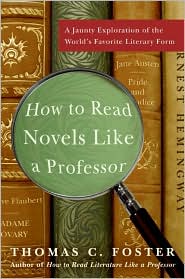
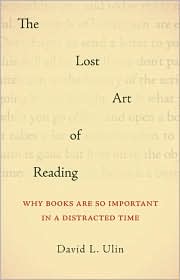 The Lost Art of Reading: Why Books Matter in a Distracted Time David Ulin (Sasquatch Books) $12.95 I’ve commented on this short, dense, and richly written book before. It starts out when this literary critic’s son says that nobody reads anymore, that he can’t stand The Great Gatsby which he is studying in school. Them’s fightin’ words to the man who just lost his job as editor of the prestigious Los Angeles Times Book Review (which was shut down—another casualty of the internet culture and “the shallows” of our times.) So he ruminates on books he loves, his earliest obsessions with the printed page, authors he loves (and there are plenty) and what happens when we are lost in books. In this “distracted age” Ulin wonders if that can even happen any more. What a good, if serious, bit of memoir, reflection and criticism. A small-sized hardback that is great to hold, nice to read, important to slowly, slowly, consider.
The Lost Art of Reading: Why Books Matter in a Distracted Time David Ulin (Sasquatch Books) $12.95 I’ve commented on this short, dense, and richly written book before. It starts out when this literary critic’s son says that nobody reads anymore, that he can’t stand The Great Gatsby which he is studying in school. Them’s fightin’ words to the man who just lost his job as editor of the prestigious Los Angeles Times Book Review (which was shut down—another casualty of the internet culture and “the shallows” of our times.) So he ruminates on books he loves, his earliest obsessions with the printed page, authors he loves (and there are plenty) and what happens when we are lost in books. In this “distracted age” Ulin wonders if that can even happen any more. What a good, if serious, bit of memoir, reflection and criticism. A small-sized hardback that is great to hold, nice to read, important to slowly, slowly, consider.
DISCOUNT
– any book mentioned –
20% off
order here
takes you to the secure Hearts & Minds order form page
inquire here
if you have questions or need more information
Hearts & Minds 234 East Main Street Dallastown, PA 17313 717-246-3333

thanks for sharing, Bryon.
have a great time at the conference in Dallas, one of the places I used to live.
Doug
Thanks, Byron. As always, you add to my list of “must reads”. I pray that your time in Dallas goes well; say hello to Dave for me.
Special thanks for sharing your gifts with TheHighCalling.org, Byron. Give my best to David and have a super time in Texas!
Thanks, Byron–you’ve just boosted my reading list, too!
I appreciate your insights on the Nafisi title– I’ve allowed myself to get put off by the title, which is lazy on my part. I forget that books can be dangerous.